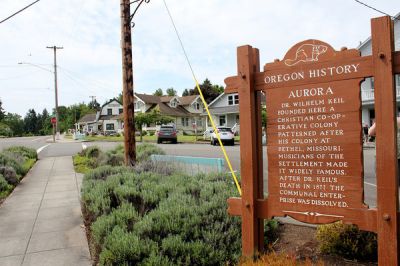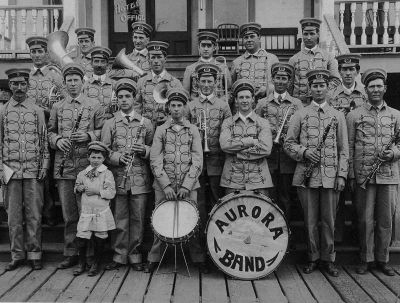History of Aurora
The Aurora Colony: An American Utopian Movement
 One of the more successful American utopian communal societies west of the Rocky Mountains in the 19th century was founded on the Pudding River in Marion County (Oregon) in 1856. The Aurora Colony was named for a daughter of the leader of the Christian communal group. It grew to a population of more than 600 individuals from 1856 to 1883. The colonists were almost all German and Swiss emigrants. They followed the basic Christian beliefs of Dr. Wilhelm Keil (1812-1877). The town of Aurora is older than the State of Oregon, which was founded in 1859.
One of the more successful American utopian communal societies west of the Rocky Mountains in the 19th century was founded on the Pudding River in Marion County (Oregon) in 1856. The Aurora Colony was named for a daughter of the leader of the Christian communal group. It grew to a population of more than 600 individuals from 1856 to 1883. The colonists were almost all German and Swiss emigrants. They followed the basic Christian beliefs of Dr. Wilhelm Keil (1812-1877). The town of Aurora is older than the State of Oregon, which was founded in 1859.
Dr. Keil, or Father Keil as he was also known, was a self-styled preacher. He was founder of two German-speaking Christian communal societies — one in Bethel, Missouri, and the other in Aurora, Oregon. He attracted a following for his fundamental Christian preaching which centered on the Golden Rule: Love God above everything; love your neighbor as yourself.
The Aurora colonists built their own homes, shops, and mills on the 18,000 acres of land acquired by Keil with communal funds. In addition, they constructed a hotel, church, and other buildings. They became successful in developing crops and orchards. The Aurora Colony became known for its delicious food, good music, furniture, textiles, baskets and other crafts.
The community still held true to its basic Christian beliefs, but Keil's isolationist view transformed into an understanding of the economic role the community could play in providing goods and products to the growing population in the Willamette Valley. He negotiated with the Oregon & California Railway to build their line through Aurora in the early 1870s as a means to connect Aurora with other cities.
 The colony quickly became famous for its musicians, friendliness, and hospitality. A hotel in Aurora soon became a rest stop for travelers from Portland to San Francisco, and was known for great food. The Aurora Colony Band became well known on the West Coast and traveled to many locations to play music—much of it written by Aurora musicians. The group was attributed with bringing about the spirit of the first Oregon State Fair in 1861. The colonists were scholarly too. Aurora's Henry Theophilus Finck became Oregon's first student to attend Harvard.
The colony quickly became famous for its musicians, friendliness, and hospitality. A hotel in Aurora soon became a rest stop for travelers from Portland to San Francisco, and was known for great food. The Aurora Colony Band became well known on the West Coast and traveled to many locations to play music—much of it written by Aurora musicians. The group was attributed with bringing about the spirit of the first Oregon State Fair in 1861. The colonists were scholarly too. Aurora's Henry Theophilus Finck became Oregon's first student to attend Harvard.
Under Father Keil's direction, there was a modest list of "don'ts" but it did not include some of the most popular ones. The colony grew tobacco and members smoked. The quality of the beer and whiskey they produced was famously high. They were well known for their thrift, productivity, and square dealing — a combination that led directly to a good deal of commercial success.
Unlike many other communal societies that were austere and isolated, the Aurora Colony was independent, self-sustaining, and content. Good music, delicious food, and friendliness combined with a love of God, brought them happiness unmatched elsewhere in the West of that day.
Between 1855 and 1870, six of Keil's nine children died — one from malaria, four from smallpox, and one from scarlet fever. Although Keil was not without critics, his leadership was instrumental in the maintenance of the two colonies.
After Dr. Keil died suddenly of a heart attack in December 1877 at age 65, both the Bethel and Aurora communal enterprises were amicably dissolved. The land was distributed to individual families. Final settlement of the dissolution was declared on January 22, 1883. Aurora's businesses and industries became privately owned with many of them operated by former colony members and their descendants.
Unlike some utopian experiences that eventually crashed and burned, the Aurora Colony lived graciously and ended gracefully.
